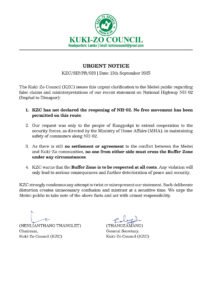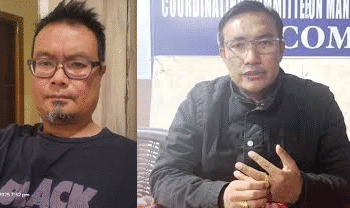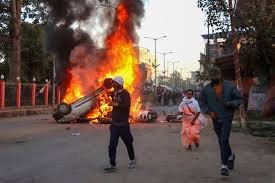Amid mounting criticism of caving in before authorities, Kuki-Zo Council clarifies it never declared NH-02 open, urging all sides to avoid spreading false claims that risk escalating tensions.
BY PC Bureau
September 15 – The Kuki-Zo Council (KZC) on Sunday issued an urgent clarification denying reports that it had declared the reopening of National Highway NH-02 (Imphal–Dimapur), a key route that has been at the center of Manipur’s ongoing ethnic conflict.
In a strongly worded notice, the council rejected “false claims and misinterpretations” of its earlier statement, stressing that no free movement had been permitted on the highway.
Council Clarification
“KZC has not declared the reopening of NH-02. No free movement has been permitted on this route,” the statement read. It clarified that its appeal was limited to the people of Kangpokpi to cooperate with security forces, as directed by the Ministry of Home Affairs (MHA), in maintaining the safety of commuters.
READ: Blow to Centre: SC Stays Key Provisions of Waqf (Amendment) Act, 2025
The council underlined that since there was no settlement or agreement between the Meitei and Kuki-Zo communities, no one from either side must cross the Buffer Zone under any circumstances. “The Buffer Zone is to be respected at all costs. Any violation will only lead to serious consequences and further deterioration of peace and security,” it warned.
KZC also condemned what it called “deliberate distortion” of its statement, accusing unnamed groups of fueling mistrust at a sensitive juncture.

Background: SoO Agreement and Ethnic Unrest
The controversy comes against the backdrop of the Suspension of Operations (SoO) agreement, signed between the Government of India, the Government of Manipur, and Kuki insurgent groups in 2008. The agreement, renewed periodically, required the insurgent groups to stay in designated camps under monitoring, in exchange for suspension of counter-insurgency operations against them.
While the pact was initially hailed as a step toward peace, its implementation has remained contentious. The Manipur government under Chief Minister N. Biren Singh withdrew from the SoO arrangement with two Kuki groups in 2023, alleging their involvement in violence and illegal activities. This decision deepened mistrust between the Meitei majority and the hill-based Kuki-Zo community, who saw it as a breach of faith.
The eruption of ethnic clashes in May 2023, following protests against the demand for Scheduled Tribe (ST) status by Meiteis, escalated tensions further. NH-02 and NH-37, the state’s two lifelines, have since been repeatedly blockaded, attacked, or heavily patrolled. Control over these highways has turned into both a symbol of authority and a flashpoint of conflict, with each community accusing the other of violating peace terms.
Current Tensions
The buffer zones along conflict-prone districts such as Kangpokpi and Churachandpur are now monitored by central forces, yet mistrust continues to run deep. The KZC’s latest statement underscores its concern that premature claims of “reopening” NH-02 could provoke confrontations and destabilize fragile peace efforts.
Analysts note that the SoO agreement’s fate—and the unresolved ethnic grievances surrounding it—will continue to influence how both highways and buffer zones are managed. For now, the KZC insists that movement across NH-02 remains restricted until a political settlement or fresh arrangement is reached.












